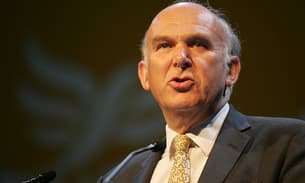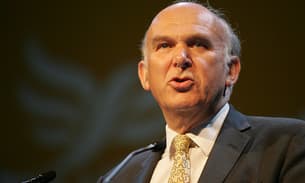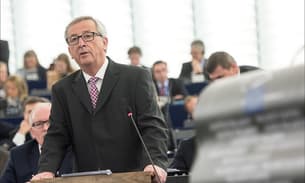
Online battle for right wing hearts and minds in German election
As Germany goes to the polls, the Bureau scans 35,000 tweets to unearth the country's home-grown Breitbarts
For Annette, a 20-something living in the east German city of Leipzig, the disenchantment set in about five years ago. She had always been a news junkie, but then started to worry that the mainstream media was distorting the facts.
Now, she says, pushing back her blonde hair, she reads “mainly on the internet”.
Her interest in alternative sources of information deepened when her bike was stolen. The theft focused her attention on what she describes as “a big rise of criminality” in Leipzig. Criminality is a persistent theme among those who are unhappy about the arrival of 800,000 asylum seekers in Germany in 2015, though she doesn’t mention this explicitly.
Today, she is a member of numerous Facebook groups which share her concerns. When someone posts an article that interests her, she does her own research around it, going to the original source where possible, for fear of being misled.
Clad in skinny jeans and a leather jacket, she looks like the kind of metropolitan hipster who might be demonstrating outside a meeting organised by the right-wing populist party Alternative für Deustchland (Alternative for Germany, shortened to AfD). Instead, however, she is attending one. Frauke Petry, the youthful co-leader of the party, is the draw this time, at a party event held at the Baroque era stock exchange.
 An image from the political party, AfD, with its co-leader, Frauke Petry, holding her newborn baby. The campaign slogan reads: "What is your reason, to fight for Germany?"
via AfD
An image from the political party, AfD, with its co-leader, Frauke Petry, holding her newborn baby. The campaign slogan reads: "What is your reason, to fight for Germany?"
via AfD
People like Annette are prime targets for a crop of websites that have sprung up in recent years seeking to challenge the liberal consensus in Germany.
Until mid 2015 there were just a few right-wing publications in the country with significant readership, including Junge Freiheit (Young Freedom), a radical right weekly, and PI (Politically Incorrect) News, a popular political blog, established as a fan-site for George W Bush in 2004 shortly after his re-election as US President but soon broadening its focus to a more anti-Islamic agenda.
Now a Bureau investigation shows that these have been joined by over a dozen new "alternative news" sites that resonate around the same themes - immigration, Islam and crime. It looks as if Germany - which is associated with boringly sensible politics - is beginning to develop the same kind of anti-establishment online eco-system that helped bring about an astonishing political outcome in the US. Even if the radical AfD party itself ends up fizzling out, this network of mutually reinforcing sites could create the foundation for more dramatic politics in Germany's future.
Chancellor Angela Merkel's welcoming gestures towards the refugees that arrived in 2015, partly due to the Syrian conflict, helped pave the way for the new dynamic. Merkel's ratings slid sharply, although they have since recovered. Right-wing movements found themselves with a new lease of life amid concerns about how the government was handling the influx.
A constellation of websites focusing on Islam, migration and crime emerged, with names like Refcrime (an abbreviation of "Refugee Crime") and Politikversagen ("Political Failure"). Before, there were just isolated voices; now, there are the beginnings of an echo chamber for the German right.
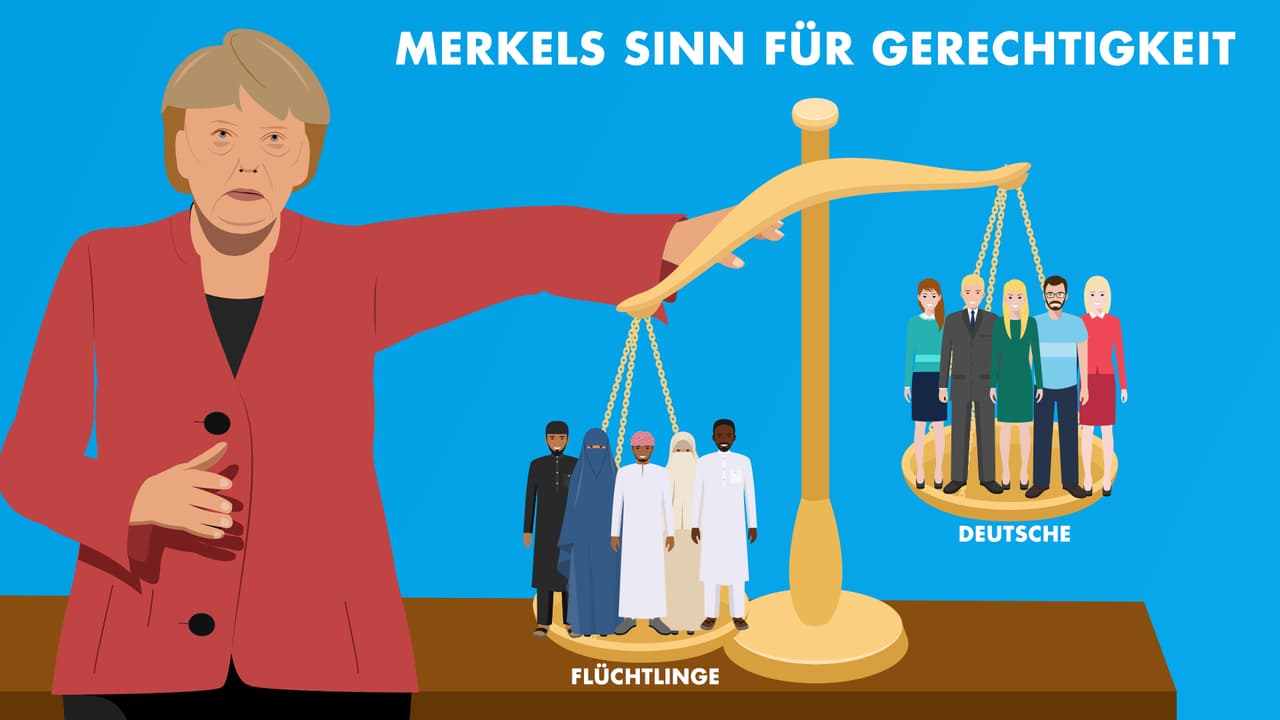
A small number of academics, journalists and politicians founded the Alternative für Deutschland (Alternative for Germany) party in 2013, largely in protest against the terms of the Greek bailout. The populist movement attracted some defectors from the mainstream parties but only really gained momentum after the refugee crisis of 2015. The AfD tacked right, focused fiercely on immigration, and shot up to 16% in the polls by September 2016. It has since gone down to around 10%, as public concern about an influx of refugees has faded. It may, however, poll well enough to become the first far right party to enter the Bundestag, the German Parliament, since 1945.
In its short life, the AfD has been beset by internal divisions and controversy. Bjoern Hoecke, one of its most prominent figures, alienated many of the party’s moderates in January when he said that a Holocaust memorial in Berlin was a monument of "shame". Frauke Petry, although nominally the co-leader, is not leading the party into the election, although she is campaigning. She presents herself as more moderate than other AfD candidates. The party's campaign for the Bundestag is led by Alice Weidel and Alexander Gauland.
Germany goes to the polls on 24 September. Chancellor Angela Merkel is likely to win a fourth term in office, as her party's lead in the polls has steadied to around 15% higher than its closest rival, the Social Democrats, but will fall short of an overall majority. She will then seek a junior partner for a coalition.
The stability of the centrist political order has, however, caused resentment amongst those who do not feel represented, particularly on the extreme right and left.
In a survey at the end of 2016, conducted by academics at the University of Mainz, 55% of those polled thought it possible that the media systematically lied and 26% believed strongly that the media and politicians worked together to manipulate public opinion.
In America, media organisations like the conservative Fox News and Breitbart, a far right American news and comment website, observed a similar well of anti-establishment sentiment and capitalised on it to create profit-making media organisations to serve it. Last year, those two organisations helped to send Donald Trump to the White House.
Now new right-wing websites are trying to tap similar sentiments in Germany. The Bureau’s analysis of them suggests that they are, collectively, more likely to be cited by committed AfD supporters than all of the mainstream media put together.
The websites carry alarmist headlines such as "The Tragedy of the Self-Islamisation of Germany", "Christian attacked with knife because of crucifix in Neukolln" and "Whoever wants to live "well and happily" in the future in Germany had better learn Arabic", all markedly different in tone from that of the mainstream press. Their existence could have implications well beyond the upcoming elections.
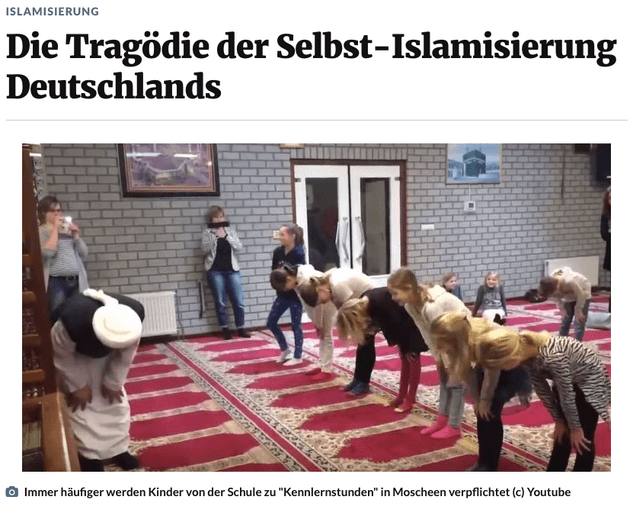 The website story caption reads "The tragedy of the self-Islamisation of Germany"
via the Philosophia Perennis website
The website story caption reads "The tragedy of the self-Islamisation of Germany"
via the Philosophia Perennis website
None of Germany's right-wing websites we looked at has a reach remotely comparable to that of Breitbart, which had 83m visits in August this year, according to the data analytics firm, Similarweb. In comparison, the most popular of the German sites the Bureau analysed, PI-News, had 5.4 million visits in August, although the German population is just a quarter the size of the US. The next most popular each attract around a million per month. Refcrime.info, a slick, anonymously registered site that records German crime reports, had just 40,000 in August 2017. Such advertisers as they’ve managed to attract include purveyors of right-wing books, Uruguayan properties and gold. Most ask their readers for donations (although refcrime.info does not do so).
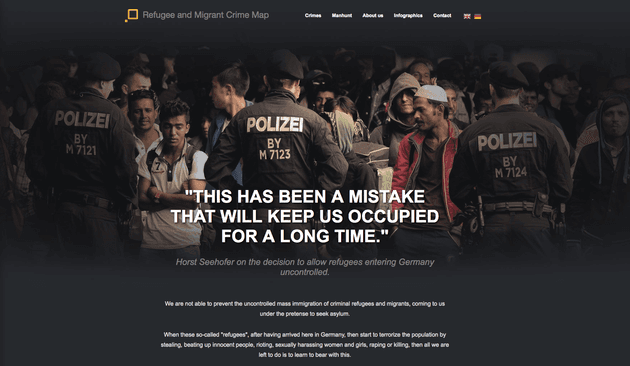 The Refcrime website landing page
via the Refcrimeinfo website
The Refcrime website landing page
via the Refcrimeinfo website
The Bureau examined websites mentioned on Twitter by a central group of AfD supporters over a two-week period during August 2017. Our selection was drawn from accounts which most frequently used the AfD's election slogan #TrauDichDeutschland! (translated as "Trust Yourself, Germany! or "Be Bold, Germany!"), along with the other accounts most frequently mentioned by them.
Between them they produced 34,885 tweets over the two-week period. We extracted 10,956 web addresses from these to see which online sources were leading the conversation. Of the top 10 most popular news sites tweeted by this group, six were from the new, alternative right-wing sites. Mainstream media, like the tabloid newspaper Bild, which is right-leaning, made up just three, with the German edition of Russia Today (RT) being the tenth.
Just outside the top 10 were two other right-wing sites, freiezeiten.net - a German spinoff of a well-known Swedish alternative news site - and a German-language, but Russian-hosted site anonymousnews.ru. The German edition of Sputnik is also in the top 20 most tweeted sites amongst AfD supporters, we found.
The Bureau's research pointed to eight other sites as significant publishers of anti-migrant right wing content, which were all established after summer 2015.
The sites which we examined are a ragtag bunch. Some host mainly opinion pieces, while others present themselves as news sites. Some are anonymously registered, while others are associated with an individual author.
The Bureau has identified some key similarities amongst the sites, with the negative effects of migration being common to all of those we examined. Other popular topics include censorship by technology companies, distrust of the mainstream media and complaints of attacks, both virtual and physical, on the AfD by leftists. So-called "Islamisation" is a major theme: articles appearing in the first week in September covered issues such as Google Earth censoring church crosses, supermarket chain Lidl removing crosses from Greek food packages and a nursery in Austria which will no longer serve pork to pupils.
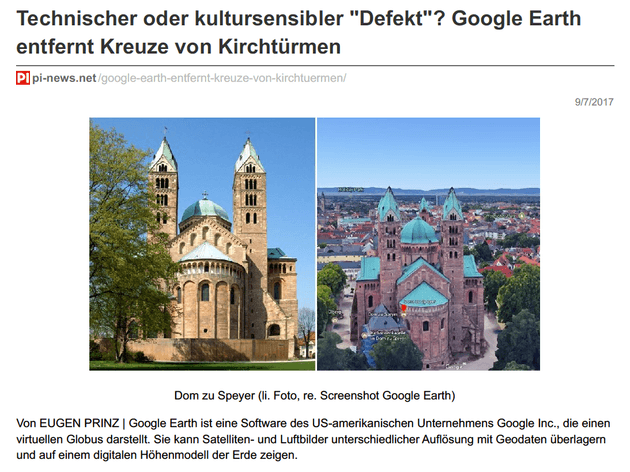 Image from PI News website showing a fake news story about Google Earth censoring church crosses on its maps
via the PI News website
Image from PI News website showing a fake news story about Google Earth censoring church crosses on its maps
via the PI News website
The content on these sites frequently offers a skewed view of reality, but that does not necessarily mean that they fall foul of Germany’s newly bolstered fake news filters. After the US election, there were fears that the German vote would be affected by a flood of disinformation and fake news. The government stepped up pressure on the social media companies, and Facebook entered a partnership with an independent fact-checking team at the journalism organisation, Correctiv, to improve their response.
In the summer the German parliament also approved a law which could see social media companies fined up to 50m Euros for not removing hate speech and defamatory content quickly enough. However, as a Bureau investigation into a misleading refugee crime map in February 2017 revealed, distorted information is much harder to police and more problematic to censor than fabricated information.
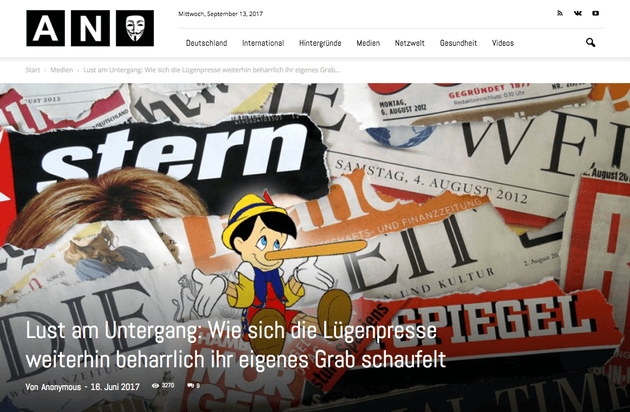 The "lying press", a phrase much used during the Nazi era, is popular once again on right-wing websites
Via Anonymousnews.ru website
The "lying press", a phrase much used during the Nazi era, is popular once again on right-wing websites
Via Anonymousnews.ru website
The sites deepen and reinforce each other’s world views. According to Similarweb, one of the top sites driving traffic to pi-news.net is politikversagen.net, an anonymously registered aggregation and comment site which gives a business centre in a small medieval town in Switzerland as its address.
Politikversagen.net also directs a lot of traffic to freiezeiten.net, a German offshoot of a right-wing Swedish publishing project. Pi-news.net is one of the sites driving most traffic to refcrime.info and anonymousnews.ru.
The sites show solidarity with each other and the more established right wing publications in the face of what some of them call the "Lügenpresse – a Nazi-era term meaning "lying press", also popularised by Trump supporters during the presidential campaign. PI-News, for example, ran a piece defending the right-wing magazine ‘Compact’ from a ‘slander’ by the mainstream media tabloid Bild.
Jonas Kaiser, a German media expert at Harvard University’s Berkman Klein Center, says that the plethora of such sites suggests that "there's now a bigger and more self-referential right-wing ecosystem.” He says this helps people more readily validate their opinions. "Once you make your way into this right wing bubble, you now have more sites to visit, and gives you an idea that there's an alternative to the mainstream.”
In discussions under a piece on the website Philosophia Perennis, about asylum seekers falsifying their claims, one commenter suggests people read an article in PI-News about how racial dilution, known as "Umvolkung" (with a nod back to Nazi-era words such as "Volk", or nation) is the goal of Germany’s ruling Christian Democrats, (CDU) party.
The sites also spread each other’s stories. On September 8, for example, Politikversagen, posted a brief summary of an article which first appeared in Freie Zeiten. The headline ran: "39 year old woman brutally raped on the way to work by a Nafri", the latter being German slang for a North African. (The original police report actually states that a 27 year old Moroccan had been arrested, based on the witness description.)
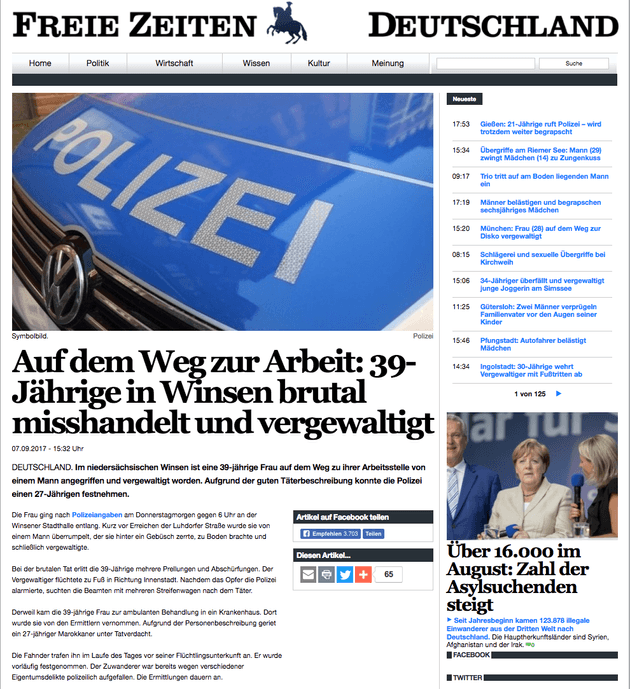 The website story caption reads "39 year-old woman brutally raped on the way to work by a Nafri"
via the Politikversagen website
The website story caption reads "39 year-old woman brutally raped on the way to work by a Nafri"
via the Politikversagen website
The relentless focus on the twin concerns of migration and Islam may not reflect the original aims of the site founders. The German right is politically and ideologically fragmented. PI-News.net began as a pro Bush site, whilst Behoerdenstress, founded by Dirk Lauer in 2011, began as a forum for his complaints about employment practices in the Hesse police force. The AfD itself started life as the party of Eurosceptic technocrats.
The 2015 refugee crisis, however, gave the fragmented right a rallying point. The widespread perception that Chancellor Merkel had actively invited refugees to come to Germany meant that right-wing websites could deploy each and every migrant crime, whether alleged or convicted as such, as an example of a government which had lost touch with the concerns of ordinary Germans.
The catalysing event was when the mainstream media, police and politicians were initially hesitant in reporting on sex assaults and other crimes, allegedly committed by migrants, on New Year’s Eve 2016 in a number of German cities. The hesitation by the media, ostensibly to check the facts of the case, fuelled wide-spread suspicion that the press was echoing the Government line.
AfD supporters complain that anyone who questions Merkel’s refugee policy, or the media’s reporting of it, is labelled an extremist. The self-styled alternative media has been keen ever since to maximise this wedge issue. “Merkel wants to bring in twice as many refugees as originally planned!” thundered a headline in Philosophia Perennis, as late as last month.
Manfred Rouhs, the leader of the far-right Pro Deutschland party, thinks it is a time of opportunity. When he first started out as a campaigner, he printed a youth newspaper and distributed it to schools. The internet, he says, has changed everything. “Formerly we reached only a few thousand people, nowadays we reach hundreds of thousands of people each week,” he says, speaking from his office in East Berlin, which is strewn with placards calling for a ban on public officials wearing burkas.
 Leader Manfred Rouhs and other party members on a march in 2016
via Pro Deutschland
Leader Manfred Rouhs and other party members on a march in 2016
via Pro Deutschland
Pro Deutschland ("for Germany") is a very small political party - it only has 1200 members, and even its Facebook page only has 20,000 likes. One of its income streams is selling the ‘Rapefugees’ T-shirts advertised on PI-News, created after the Cologne market assaults. Pro Deutschland is supporting AfD in the election, rather than fielding its own candidates.
However, Rouhs has clearly thought a lot about media strategy. He says he has benefited from the advice of a British communications consultant. The consultant advised him not to post opinions on Pro Deutschland’s Facebook page, explaining that people preferred to have facts.
Rouhs says he also thinks the content has to be credible, even though fake news often generates more traffic. “If we’re not more credible than the mainstream media we will still be consumed, but more as entertainment,” he says.
He says that the growing number of sites such as PI-News will make it easier for people to voice their true feelings about issues like immigration, referencing the communications theorist Elisabeth Noelle Neumann’s theory of the “spiral of silence”, where people stay silent when they feel that their views are in opposition to the majority. More sites offer "more confirmation" of peoples' viewpoint, he says.
He thinks there may be enough of a market in German for one single radical right website to flourish, along the lines of Breitbart, even though no-one has cracked it yet.
US campaigning styles are also creeping in to the election as it nears polling day. The AfD has hired US digital communications firm Harris Media, Spiegel Online revealed last month. According to Spiegel, Harris Media has worked for the Trump campaign and UKIP in the past.
Meanwhile, the investigative journalism organisation Correctiv has linked Harris Media with a sombre website which emerged last week and shocked many liberal commentators with its ultra-negative campaigning approach. The site, which only mentions the AfD on its contact page, describes Merkel as an "oath-breaker" and lists the number of people who it claims have become victims of terrorism "through Merkel's failure."
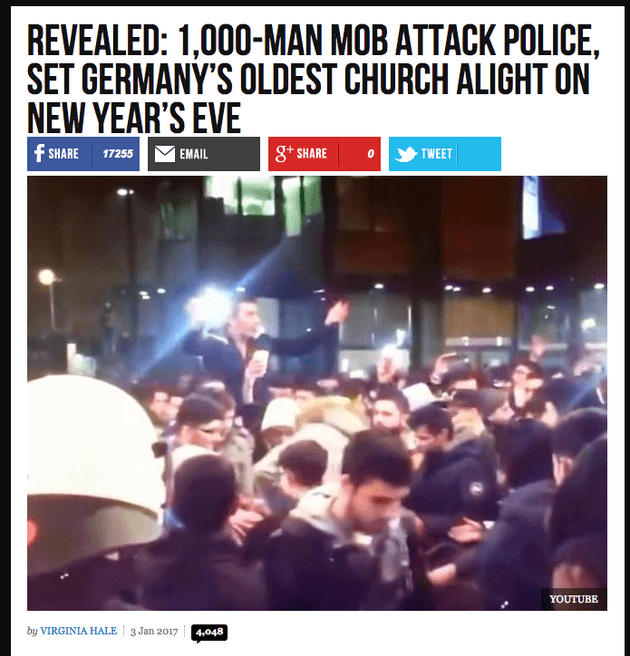 Breitbart fake news photo caption about Germany
via the Breitbart website
Breitbart fake news photo caption about Germany
via the Breitbart website
Last year, Breitbart itself announced it was going to launch a version of its site in German which caused some consternation in the mainstream press, especially after the site published a story implying that migrants had set fire to a historic church in Dortmund that turned out to be a mixture of distortion and insinuation. So far, however, Breitbart’s plans have come to nothing.
Andre Haller, an expert in the German media scene at the University of Bamberg, thinks that a powerful anti-establishment media, like that in the US, is highly likely to prosper in the near future.
“In 2000 you only had Fox News and some conspiracy blogs - now you have Breitbart,” he says.
“I think this is a phenomenon that will spread over other western democracies.”
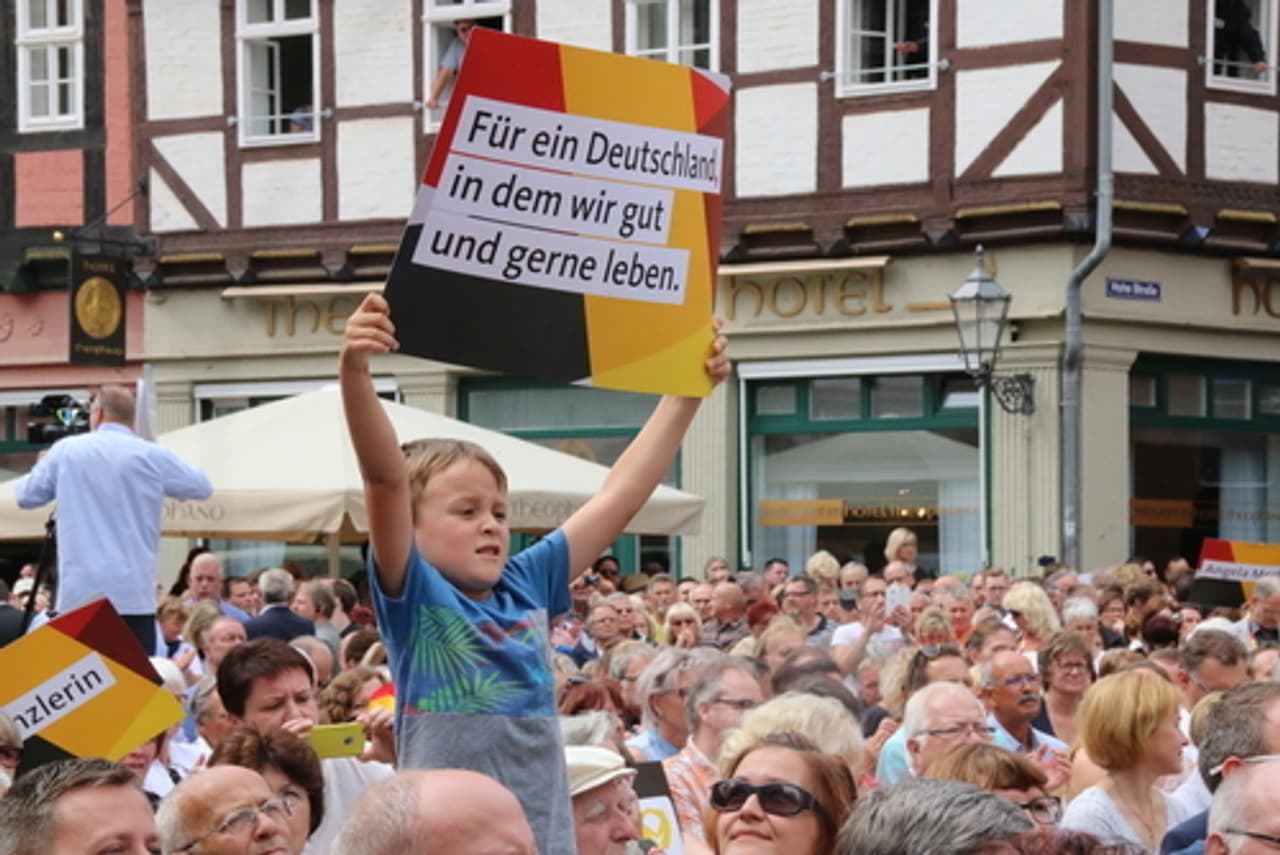
The German election will continue to be fiercely fought by the AfD, even if it is lagging in the polls behind Angela Merkel's resurgent CDU party. Back at the AfD campaign event in Leipzig, there were certainly echoes of Trump’s America. One of the attendees explained that he was too nervous to give his name in case it cost him his job, citing the precedent of alt-right protesters in the US. Though most of the attendees appeared to be middle aged, a few young people also attended. The younger audience members tended to be most sceptical about the media.
“When you read the mainstream media on political and criminal issues, you’re fooled,” said one man with a leather jacket and fashionable beard, who also refused to give his name. The audience filed out of the talk into a phalanx of police, as anti AfD protesters up the street chanted ‘Petry - get lost!”
Despite all the noise that AfD is making, the anti-immigrant agenda does not appear to be making significant political inroads. Although it may take seats in the Bundestag (the German Parliament) for the first time, many media commentators predict that it is nothing more than a protest party, which will then lose momentum. With the number of asylum seekers having drastically decreased, immigration is not a top concern for most Germans. Even Rouhs, for his part, acknowledges that the “Islam and Muslims” approach of sites like PI-News limits their mainstream appeal.
The prevalent mood at Leipzig's old stock exchange is not so much excitement about a particular party or ideology as deep distrust of the government and the mainstream media’s version of events.
Annette’s attitudes are typical of this scepticism. Like many of the people interviewed, she expresses doubt about the veracity of both mainstream and alternative media. “I don’t trust anything,” she says.
A version of this also appeared in the EU Observer.
Main image, of AfD supporters, via Reuters/Reinhard Krause.



